#in true Shakespearean tradition
Text
Elon Musk has so much an opportunity to actually be funny if he fights Zuckerberg. He should go in with poison tipped boxing gloves. But then he sees that Besos has drank from the poisoned cup of wine, he knows the scheme is up. He’ll strike Zuckerberg but, in the ensuing scuffle, they switch gloves. Zuckerberg will land an opposing blow to Musk, but it will be too late.
#in true Shakespearean tradition#it’ll be a comedy because everyone will be dead#musk#Elon musk#twitter#mark zuckerberg#musk vs zuckerberg#besos#Jeff besos#meta#twitter x#196#r/196#shitpost
26 notes
·
View notes
Note
Drop some AUs that's you love! I want to read all the things >:)
P.s. hope your day is going well! Give your sweet pup a good scratch behind the ears for me 💜
Hullo lovely!
Ahhhhh!! This is a great ask, okay here we go!!
In June and June and More June by Dragonslaeyr:
"When Bilbo agreed on a trip to Erebor to clear up the last of his mother's estate, what he didn't count on was falling in love with its gorgeous landscape, the fiercely proud people, and yes, the delicious food. Now if only he could figure out why everyone was acting so strangely around his neighbours..."
-
Whisper of the Heart by @abliafina-18782
"When Bilbo discovers all of his library books have been checked out by the same guy, a Thorin Oakenshield, maybe it will finally give him the push for adventure he's always wanted."
-
Love-In-Idleness by perkynurples
"Taking Bilbo Baggins, a successful movie actor who is only just getting used to the perks and intricacies of becoming A Face People Want To See, and putting him together with Thorin Oakenshield, with his very traditional (read: slightly backwards) ideas about what constitutes Real Art and Real Talent, might very well be viewed as just some clothead’s idea of a joke. But there are jokes, and then there are carefully calculated risks the size of controversial reproductions of classic Shakespearean plays - for Bilbo, it is the chance of a lifetime to prove himself to all those who have ever deemed him too one-dimensional to even attempt stage, while Thorin has the opportunity to get out of the rut that’s been hindering his career for so long now, and shine in a role worthy of his talent once again. That is if the two learn how to share the same space for more than ten minutes without wanting to tear each other’s hair out. The course of true love never did run smooth, after all…"
-
Dragonhearted by @lordoftherazzles
"The grandson of a greedy king and his dwarvish companions fall under the curse of literal dragon sickness - at least for Thorin. Bestowed by Smaug the Terrible, an enchanter whose other form is also that of a dragon, the vilest of fire drakes from the north, is seeking riches at the end of a hard trial for the prince of Erebor. Doomed to live his life as a ‘not-quite-dwarf’ and ‘not-quite-dragon’, Thorin and his companions are forgotten by the world around them.
The decades roll by and the curse shows no sign of lifting, for Thorin was tasked with proving that his heart was worth saving and that he would not be corrupted by gold lust like his grandfather. All seems bleak until the arrival of one quirky little hobbit of the Shire with his mother’s stubborn streak and his father’s gentility. Bilbo Baggins, a prisoner of this draconic beast, soon begins to show Thorin just what a heart worth saving feels like."
-
Bookbinder//Songwriter by @lordoftherazzles
"Thorin Durinul has always dreamed of making it to the big leagues in the music industry. Ered Luin’s newest citizen, Bilbo Baggins, an aspiring writer and all-around bookworm, has recently taken ownership of the mountain town’s dusty old corner shop, now, Bag End Books. They weren’t looking for love, but now they can’t imagine tackling life’s challenges without each other."
-
...There are so, so many more, but I haven't read half the fics I want to, and these are a good place to start if you're looking for AUs!
Let me know what you think!! 💛
#its-still-atlas#fic rec#au fic#bagginshield#thilbo#the hobbit#bilbo baggins#thorin oakenshield#conkers-theficwriter#conkers corner
40 notes
·
View notes
Note
How would the ROs celebrate Valentine's Day with MC?
Happy Valentine's, Author! ❤️
Happy Valentine's Day! Today's a great day to say I love all of you wonderful people ❤️
August is boring a wine and dine type of Valentine's date, especially if your relationship is somewhat new. They'll want the entire town to know they're the one you're spending Valentine's Day with. They'll take you to your favourite restaurant, and chances are it's a sentimental choice because they, at one time, ate there with you as friends. The cooks always thought you guys were going to get together. They'll give you a necklace or bracelet, and they definitely want you to wear it all the time.
Blair would make you breakfast in bed, and wake you with a kiss. They're such a romantic simp, so expect a massive flower bouquet too. They're a bit traditional, so they'll take you out for dinner that night to a nice restaurant too. Afterwards, they'll suggest taking their dog, Seger, for a leisurely walk and they'll insist on holding your hand. Also, fun fact, Blair gets Seger a Valentine's Day gift too 🥺
Wren will take you on an unhinged, semi-unplanned date. They'll set up a picnic with your favourite foods, and it'll most definitely end with them very loudly proclaiming their love in an over-the-top Shakespearean-like monologue in a public space, totally interrupting other couples' dates. Something like "Oh, my dearest of loves, for never was a story of such true love like ours. You hold my beating heart in the palm of your hand." They'll do this even if you've only been together for two weeks 💀
Neve would cook your favourite meal, and they'd plan to spend the night cuddling on the sofa and watching movies. They're completely fine with you picking all of the movies, they just want to spend time with you. They'll be prepared with the best snacks too, like popcorn and chocolate.
75 notes
·
View notes
Text

I finally got around to watching Requiem of the Rose King.
Let me tell you, this manga got me back into history; I read a lot on the Wars of the Roses after reading this series. I loved the story and the artwork. The creator, Aya Kanno, also did Otomen, which is an adorable manga about defying traditional gender roles and learning acceptance, so she does good stuff. Requiem of the Rose King is based off of several Shakespearean plays and the English civil war that eventually brought about the downfall of the Plantagenet Dynasty.
Keeping true to Kanno's previous work about positive messages about gender, the story also features an intersex individual as the main protagonist and the emotional strife they face in a medieval world that cruelly labels anyone who doesn't fall into the strict 'male or female' gender as 'demonic.' Richard's father declared he should be raised male, he is denied the affection from his mother who is horrified she gave birth to a 'demon,' and his brothers are unaware of their intersex sibling. In addition, Richard is tormented by his 'female half' and denounces his own body as demonic, which is a true tragedy brought about by a time period of people who just didn't know any better and couldn't see past their own prejudices.
Requiem of the Rose King is a beautiful story and I highly recommend the manga.
So the anime....
Oh, the pacing...the pacing....holy shit, slow down, slow down! Episode 1 practically raced through volume 1. Shit, if I hadn't read the manga first, I probably wouldn't have a clue was what was going on.
I'm gonna stick it out on the hope it gets better and treated the first book like a severely rushed prologue, but...wow, I am not impressed by this opening.
#requiem of the rose king#manga vs anime#gender positivity#gender roles#aya kanno#otomen#intersex#representation#lgbtq+#criticism#defying traditional gender roles#shakespeare
23 notes
·
View notes
Text
Stop Confusing Shakespearean Tragedy With Greek Tragedy: Or, Tragedy of Circumstance vs. Character
So this mini analysis/rant was brought to you by that Harley Granville-Barker quote (via John Green) about R&J being a tragedy of “youth as youth sees it.” Not only is this reductive but also the quote just…exemplifies the struggle of academics to categorize Shakespeare’s mid-90s tragedies. Not just R&J but Hamlet and even Macbeth as well (with Othello roped in sometimes as a 🤷♂️). After all, in these plays there is usually not one Big Tragic Flaw (Macbeth sometimes gets a pass for Ambition) that undoes the tragic protagonist and leads them to their utter ruin. These characters’s flaws are instead just part-and-parcel with their humanity.
So a lot of the time academics just do a little awkward side-step and say “Weeeell, the tragic protagonists in these things are young, even the Macbeths, soooooo Tragedy of Youth(tm) maybe??” but that of course is just academic weak sauce, no true spice at all. The fact that these protagonists are young is necessary to the worldbuilding plausibility, not the tragedy. As we have seen before, an older R&J and Hamlet and even Macbeth have been done before and were in fact the norm until very recently. It’s just much more plausible to their characters and their situation (that of relative powerlessness) if they are indeed young than if they were older.
However, their tragedies are not due to youth or even character frailty so much as circumstance. Unlike King Lear, Othello, and Coriolanus, Macbeth, Hamlet, and R&J’s tragedies are ultimately very situational.
What Is Tragedy?
Tragedy in the Greco-Roman tradition stems from harmatia, a character flaw that leads to the tragic protagonist’s undoing. This is usually the definition academics have when gauging Shakespearean Tragedy, even though Shakespeare had a vastly different take on tragedy.
In Greek tragedy, the Tragic Protagonist’s fate was written in the stars, unmovable and unshakable no matter what the tragic protagonist does (see: Oedipus Rex). The TP cannot escape fate, no matter what he tries.
By contrast, Shakespearean tragedy is never fully inevitable. It can always, at some level, be preventable. However, given the situation or circumstances in which the tragic events occur, as well as the tragic protagonists, the tragedy becomes inevitable from a certain point onwards—the inciting event.
This is true for both forms of Shakespearean tragedy, character and circumstance. That said, Shakespeare’s character tragedy is usually the most unyielding of them all, since it hedges more closely to the Greek model. With King Lear’s machismo and temper, Coriolanus’s military fascism, and Othello’s honor armor, the situation in which their tragedies unfold does not matter much, ultimately. You gain an understanding that this tragedy would have happened much earlier or much later and more or less along these same lines. These characters are too set in their ways to change and would have reacted in very similar ways in similar situations.
Not so for R&J, Hamlet, and Macbeth. Their tragedies are much more dependent on their circumstances and their world (particularly re: patriarchy and hierarchy) than anything else. Without that context, I think it’s clear these people would never have done what they did.
Both R&J, Hamlet, and Macbeth are flawed characters, but their flaws are not inherently tragic ones. Rather, their flaws stem from ordinary human emotions and desires that pretty much everyone has. R&J are young and in love and want to be together; Hamlet is a sensitive intellectual mourning his beloved father, with zero tolerance for BS, including Murderous Uncle BS; Macbeth hopes to move up in the world and secure a better position for him and his wife.
When Character Does Matter: Tragic Protagonists Must GAF
This is not to say character doesn’t matter completely in these Tragedies of Circumstance. On the contrary, they very much do.
Because no matter how much of a clusterfuck the tragic situation or circumstance, there is no tragedy if the tragic protagonist simply…well, DNGAF.
For instance, if Hamlet just decided to 🤷♂️, shut his mouth, and keep his head down and accept Claudius as true ruler because, well, what can he do…then most likely there would have been no tragedy for him. He is the prince of Denmark, after all. Claudius and Gertrude are shown to be content at the merest show of compliance. Even if Denmark’s moral and legal corruption would have doomed them, even if Fortinbras were successful in this timeline, it would not have been Hamlet’s tragedy alone.
If R&J had truly been the lusty fiends Internet clowns constantly claim they are, concerned only with getting themselves good and properly laid, then they would not have gone as far as they did with their ~concupiscence. Both their passivity and obedience would have been inertia enough and they would have chosen not to rock the boat. Hell, it must likely wouldn’t have even gotten to that point. Fuckboy!Romeo would have tried to persuade Juliet to give it up without marriage and fuckgirl!Juliet would have let him. At worst they would have eloped and fucked off out of Verona—and hence, no tragedy. And if they were indeed more invested in the feud, then any love relationship would truly have been out of the question.
And if Macbeth had not met the witches, had not truly not had cared for climbing rank, or just DNGAF about his wife acting as the man of the house, then killing Duncan and usurping him would not have proven to be an allure. He would simply continue serving Duncan or the next ruler.
But of course, that isn’t possible. Why? Because then the personalities of these Tragic Protagonists would be completely different—much less sympathetic, to be sure. Who would care about a Danish prince who ignores a truly serious miscarriage of justice? Who would care about the fate of two selfish Italian lovers? Who would respect a Scottish sycophant who bends the knee at whoever is in charge? Not to mention that there just simply wouldn’t be a plot to begin with and the story would be completely changed for the worst.
It just isn’t in Hamlet’s character not to care about his father’s murder. It just isn’t in R&J’s characters to suddenly start caring about the feud and stay away from their love. And it just isn’t in Macbeth’s character not to succumb to the pressures of masculinity, as his culture demands he be.
Tragic protagonists do not have to be sympathetic or likable, although their plight usually is. But Tragedies of Circumstance almost universally call for sympathetic protagonists who would react as most people would in their situation. Nobody would react with indifference at learning their beloved father has been murdered. Nobody would consider giving up a promising relationship for a violent and senseless feud. And if tempted enough, anyone would risk doing something unethical and immoral to get ahead.
Summing Up
Shakespeare obviously had a very different idea of tragedy than the Greeks—precisely because he was responding to the Greek model in the first place while he was adapting the source materials for his plays. And indeed, the very act of adaptation would prompt taking a different approach, however slight.
So if his early tragedies don’t seem as inevitable as they are until after a certain turning point (Tybalt’s death, Polonius’s death, Duncan’s death)…that’s the point. Tragedy is never fully inevitable in Shakespeare because almost nothing about our world and society is. We literally just made it up. Men must be tough and never cry and if someone insults them they must fight them even risking their lives? Made up BS. Women must be quiet and obedient and never have sex outside of marriage or else they’ll be tainted? Made up BS. And all of that BS obscures what human beings really are and what they truly want. And ultimately, that’s what all these tragedies boil down to.
#romeo and juliet#macbeth#hamlet#shakespeare#william shakespeare#shakespearean tragedy#sometimes i sleep but other times i choose violence#er my form of violence#shakespeare meta#rj meta#r&j meta#hamlet meta
87 notes
·
View notes
Text
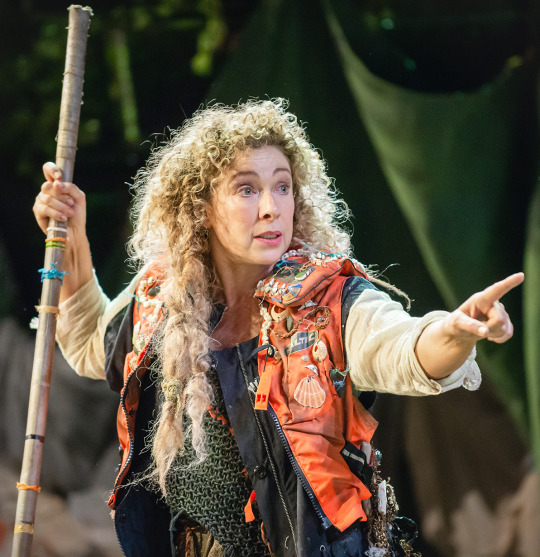


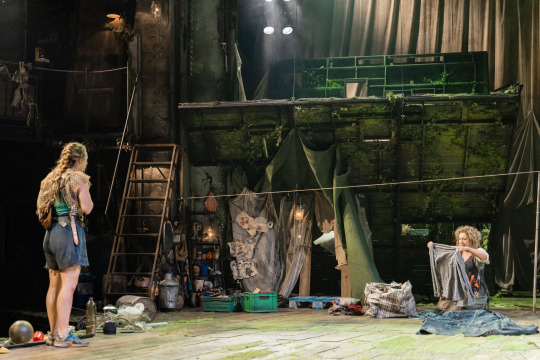
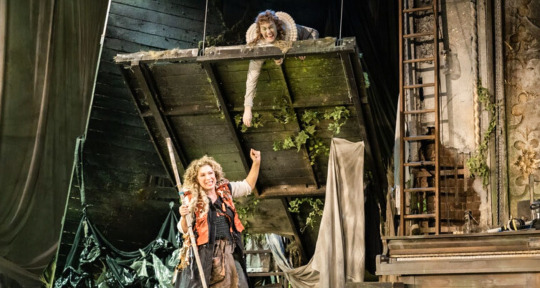
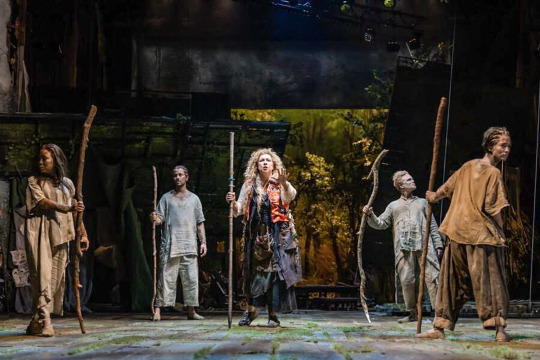
REVIEW: THE TEMPEST: Alex Kingston is a magnificent Prospero
Royal Shakespeare Company, Stratford-upon-Avon
If there were prizes for inventive recycling of props, this RSC staging would get the soup-tin statuette. Oil drums are rolled to illustrate anecdotes, drunkards quaff from petrol cans and Ariel’s flute is twisted together from plumbing pipes. With references to “the quality of the climate” and “mutinous winds”, The Tempest sustains director Elizabeth Freestone’s contemporary interpretation with little strain, helped by the opening storm being made by man. Or, in this version, woman. Alex Kingston’s Prospero, though still an exiled “duke” of Milan, is mother to a daughter. This affects the text, neutralising Shakespeare’s “farther” puns and forcing recounts in Miranda’s lines about how many men she saw before Sebastian, while Prospero’s rather creepy concern with the security of Miranda’s hymen feels unlikely from a bohemian modern mother. Gender-stubbornness about Shakespearean roles would have robbed us of great Lears from Glenda Jackson and Kathryn Hunter, and also of Kingston’s magnificent, revelatory Prospero. “Our revels now are ended” and “this rough magic I here abjure”, the soliloquies disavowing super-powers, are often played as elegiac farewells, but from Kingston feel closer to Christ at Gethsemane, a war between two natures. This Prospero rages against the dying of her might. Heledd Gwynn’s Ariel, hair and makeup channelling Aladdin Sane, is alternately punchy, touching and tuneful until a spectacularly athletic exit. A very modern staging that is fundamentally true to the text and the RSC’s intellectual, rigorous, clear-speaking traditions. At the Royal Shakespeare theatre, Stratford-upon-Avon, until 4 March.
#Alex Kingston#Kingston Edit#Royal Shakespeare Theatre#Shakespeare#The Tempest#Threatre#2023#Royal Shakespeare Company#Threatre Review#OMG It's Moll Hair 😍
40 notes
·
View notes
Text
The Little Mermaid (1989)
🧜♀️🦀🐠
Based on the Danish fairy tale by Hans Christian Andersen, this animated classic from Walt Disney Pictures is about a beautiful teenage mermaid named Ariel who dreams of becoming part of the human world against her father’s wishes.
The voice cast includes: Jodi Benson as Ariel, Christopher Daniel Barnes as Ariel’s human love interest Prince Eric, Kenneth Mars as Ariel’s father and ruler of the merfolk King Triton, Pat Carroll as a scheming, powerful sea witch named Ursula, Samuel E. Wright as Jamaican crab/court composer Sebastian, Jason Marin as Ariel’s best fish friend Flounder, Buddy Hackett as Ariel’s seagull friend and “human expert” Scuttle and Paddi Edwards as Ursula’s moray eel minions Flotsam and Jetsam.
Jodi Benson (an honorary legend known for her work in this film and other Disney projects such as Flubber, Enchanted and the second and third Toy Story movies) has delighted generations of Disney fans with an astonishing vocal performance that conveys a sense of charm, spunk and naïveté to a mythological heroine. In a way, those distinctive qualities can make anyone fall in love with Ariel. Pat Carroll is extremely talented to the extent that her voice alone is sufficient to bring an irresistible sense of awe and wickedness to the table. Samuel E. Wright is quite the professional stage actor, which easily complements his animated crustacean going from royal advisor to romantic adviser.
In contrast to the ancient, nameless characters of Hans Christian Andersen’s tale, this particular film enhances its character with modern techniques equivalent to real-life experiences. For example, Ariel is a growing teenager tired of being treated like a kid by her overly protective father, thus she is willing to leave home to seek out her heart’s desire. This particular aspect gives viewers a fresh look at the relatable circumstances of a troubled relationship between parent and child (something that was rarely depicted in earlier animated films during Walt Disney’s lifetime). Ursula on the other hand represents a former Shakespearean actress who not only turns to dark magic, but has practically become a shady dealer in the process of trying to work her way back to the top. Ariel’s aquatic sidekicks (Flounder and Sebastian) are exclusively included to add light and humor to an otherwise tragic (and slightly disturbing) work of literature.
The original fairy tale is somewhat similar to the personal life of Hans Christian Andersen in terms of yearning to belong in a completely different world, even if it comes at a price. In Andersen’s case, he was literally a fish out of water in society, hence his desire to express change in identity and the unfairness of social class through fictional storytelling. In Ariel’s case, she strikes a deal with Ursula to receive a pair of human legs, though the price she has to pay the sea witch in return is her voice. Furthermore, if Ariel succeeds in winning Prince Eric’s affection through true love’s kiss, she will not only become a permanent human (and regain her voice), but she can never be with her water-dwelling family again. Meanwhile, Ursula plots to possess Ariel’s soul and dethrone Triton as ruler of the ocean, whereas Andersen’s version of the sea witch had no evil intentions whatsoever.
The traditional Disney animation doesn’t just make every underwater scene look scientifically authentic (especially the formation of bubbles, rippling light pattern, the movement of Ariel’s drifting hair and flexibility of Ursula’s tentacles), but Ariel’s girlish looks are inspired by Charmed actress Alyssa Milano, while Ursula’s physical appearance is loosely inspired by drag queen performer Divine. What’s more, a violent storm (during which Ariel rescues Eric from drowning) is shown as described in Andersen’s original story accompanied with some pretty amazing technical effects.
The soundtrack contains a mixture of Broadway, Calypso, pop, show tune and reggae music composed by Alan Menken (whose contribution to this film led to his continuation as composer of other Disney works up to the present time) and memorable songs written by the legendary Howard Ashman. The track list includes: “Fathoms Below”, “Daughters of Triton”, “Part of Your World” (a power ballad that serves as the film’s “I Want” song and occasionally performed in concert by Jodi Benson), “Part of Your World (Reprise)”, “Under the Sea” (an upbeat song Sebastian sings to try to convince Ariel of the joys of underwater life, which won the Oscar for Best Original Song), “Poor Unfortunate Souls” (a hair-raising number sung by the villain whose lyrics are enticingly deceptive), “Les Poissons” (which occurs when Eric’s crazed chef tries to cook Sebastian), “Kiss the Girl” (where Sebastian orchestrates a romantic atmosphere to encourage Eric to kiss the voiceless girl who is indeed the one) and “Vanessa’s Song” (specifically the scene where Ursula is preparing to marry herself to Eric using both her human disguise and Ariel’s voice).
Finally, other than the fact that this particular version of The Little Mermaid heralded the arrival of a new golden age of traditionally animated movies known as the Disney Renaissance, the central theme of the story is focused on love crossing boundaries and the importance of self-expression. All in all, I enthusiastically recommend this gorgeous, captivating film that really has made a splash.
#disney#disney renaissance#the little mermaid#animation#ariel#jodi benson#hans christian andersen#the little mermaid 1989
19 notes
·
View notes
Note
I know it's too early to be considering The Invisible College II: Electric Boogaloo, but nevertheless — I think an ancient Athens-Renaissance London-prerevolutionary Moscow trajectory would be incredible, along the lines of your review of Steiner's 'Tolstoy or Dostoevsky' book, tracing the ley lines of the epic/novelistic in parallel to the dramatic/tragic*.
Semester I: Homer & the Greek tragedians; plus maybe Aristophanes/Plato/some of the Romans
II: Shakespeare; plus maybe Marlowe, Jonson, Montaigne, and other environs
III: Dostoevsky/Tolstoy; plus a smattering of Chekhov/Gogol/Pushkin
*For those who haven't read it, one of John's best paragraphs: "But Steiner has a bigger point to argue, namely, that these modes—epic and tragedy—are not merely aesthetic but metaphysical, ethical, and political, bearing within themselves two very different attitudes toward life. In the Homeric-Tolstoyan epic, we find a land-based evocation of natural rhythms, of the vast movements of the seasons, an ultimately hopeful sense that vitality surges on through and past the individual, who would do well to join him- or herself to the motions of the earth. In the Shakespearean-Dostoevskian tragedy, on the other hand, we see a deracinated court-and-city world of mistrust, suspicion, demonic urges, weird passions, perverse convictions, pervasive violence, cruel comedy, an underground perspective that ends in chastened humility before the suffering mystery of things."
Thank you! This is superb; I hope you write syllabi for a living! I'd already planned to get to Shakespeare and the Russians, but this is an exciting structure, a path through the whole tradition I'd never conceived in quite these terms. I will absolutely keep it in mind.
(And for the rest of you, have you enrolled in The Invisible College yet? It's in session all year round. Please join me for the current semester, Modern British Literature from Romanticism to Modernism, to be followed by a summer of Ulysses and Middlemarch, and then a fall semester on the American Renaissance culminating in Moby-Dick. The first lecture, "William Blake: The Poetic Genius Is the True Man," is free to all.)
#academe#literature#literary studies#george steiner#russian literature#leo tolstoy#fydor dostoevsky#william shakespeare#homer#william blake
2 notes
·
View notes
Text
"Hamlet" by William Shakespeare is one of the most iconic and frequently adapted plays in the literary canon. Its exploration of themes such as revenge, madness, and existentialism has inspired numerous adaptations across various mediums. Here's an in-depth analysis of "Hamlet" and some notable adaptations:
### "Hamlet" by William Shakespeare:
1. **Existentialism and Moral Ambiguity:**
- "Hamlet" is renowned for its exploration of existential themes. The protagonist, Prince Hamlet, grapples with moral ambiguity, contemplating life, death, and the consequences of revenge. The famous soliloquy "To be or not to be" encapsulates these existential reflections.
2. **Madness and Deception:**
- Hamlet's feigned madness and the broader theme of deception add layers to the narrative. The play explores the thin line between reality and illusion, raising questions about the authenticity of appearances.
3. **Complex Characters:**
- Characters like Claudius, Gertrude, Ophelia, and Polonius contribute to the complexity of the play. Each character has intricate motives and relationships, adding depth to the exploration of human nature.
4. **Dramatic Irony:**
- Shakespeare employs dramatic irony throughout the play, where the audience possesses knowledge that some characters lack. This creates tension and engages the audience in the unfolding tragedy.
5. **Ghost Motif:**
- The appearance of King Hamlet's ghost introduces the supernatural element and sets the revenge plot in motion. The ghost serves as a catalyst for Hamlet's internal conflict and moral dilemma.
### Notable Adaptations:
1. **"The Lion King" (1994):**
- This animated film draws clear parallels with "Hamlet," portraying Simba's journey mirroring Hamlet's quest for justice and self-discovery. The uncle Scar corresponds to Claudius, adding a familial and Shakespearean dimension to the Disney classic.
2. **"Rosencrantz and Guildenstern Are Dead" (1990):**
- Tom Stoppard's play and subsequent film take a unique perspective, focusing on two minor characters from "Hamlet." It explores existential themes and the concept of fate, providing a meta-theatrical commentary on the original play.
3. **"Hamlet" (1996) - Directed by Kenneth Branagh:**
- Branagh's film adaptation offers a faithful rendition of the play, emphasizing its theatrical roots. The unabridged version allows for a comprehensive exploration of the characters and themes, staying true to the original text.
4. **"Hamlet" (2000) - Directed by Michael Almereyda:**
- Set in modern-day New York, this adaptation features Ethan Hawke as Hamlet. The contemporary setting introduces new layers to the play's exploration of power, corruption, and surveillance.
5. **"Hamlet" (1948) - Directed by Laurence Olivier:**
- Olivier's film, a more traditional adaptation, won several Academy Awards. It is praised for its visual aesthetics and Olivier's nuanced portrayal of Hamlet.
6. **"Hamlet" (2015) - Directed by Kenneth Branagh:**
- Branagh returned to "Hamlet" in 2015, this time focusing on the character's internal struggles. The film explores Hamlet's psychological state and emphasizes the emotional depth of the play.
### Common Themes Across Adaptations:
1. **Reinterpretation of Characters:**
- Different adaptations may reinterpret characters, offering new perspectives on their motivations and actions.
2. **Modernization and Contextual Shifts:**
- Many adaptations place "Hamlet" in different time periods or cultural contexts, highlighting its universality and adaptability.
3. **Focus on Specific Themes:**
- Some adaptations emphasize particular themes such as political intrigue, mental health, or familial relationships, providing a fresh lens on the original material.
In conclusion, "Hamlet" continues to captivate audiences through its timeless exploration of human nature and existential dilemmas. Its adaptability to various mediums and reinterpretation across diverse contexts underscore its enduring relevance in the realm of literature and performance.
#shakespeare#hamlet#movie adaptation#movie analysis#lion king#rosencrantz and guildenstern are dead#chatgpt
4 notes
·
View notes
Text
ROMEO AND JULIET: A SHAKESPEAREAN FAIRY TALE

(Thanks to @giuliettaluce for her contribution to this essay's development)
@ardenrosegarden @princesssarisa @angelixgutz @gravedangerahead @sabugabr @superkingofpriderock @notyouraveragejulie @chansondefortunio @faintingheroine
I have recently started to think that Romeo and Juliet could be analized as an example of what i am calling a Shakespearean Fairy Tale, rather than as a realistic drama.
When i started researching fairy tales in general, those are the main characteristics i found in common between them, with some variations from one story to another:
*Not feeling the need to give a deep explanation about every fantastic detail, and magic not being allowed as an universal explanation.
*A simple narrative, not worried very much about the small details.
*A world that avoids being too grounded in reality, where a little escapism is key.
*An air of mystery is kept to the reader/listener, who always feel as if there is something more happening off the limits of the story.
*Usually young, domestic heroes, who are motivated by small scale events, like finding their one true love, surviving hunger and poverty, wanting to cure the illness of a relative, escape their abusive home, etc., while having to deal with obstacles imposed by a world bigger than them and that they don't understand.
*Those stories mostly originate from archetypical characters that were created in myths of the oral tradition.
Now, leaving a bit the generalization, and going to specifically Shakespeare, what makes a Shakespearean Fairy Tale?
Well, with the exception of his History Plays (and even they must be take with a grain of salt because his sources were Historical Chronicals Written by Winners and as such tooked lots of freedoms with real places, people and events), Shakespeare's other plays usually borrow the NAMES of Real Places, but they aren't a FACTUAL DESCRIPTION of Real Places, nor their climate, nor their geography, nor their culture, nothing, only NAMES.
And as such you can have an Old Britain and a Medieval Scotland that Adores Greek-Roman Deities (King Lear, Macbeth), an Athens characters with English Names like Botton, Snowth, Flute and German-Celtic Fair Folk (A Midsummer Night's Dream) , a Forest in France with African Lions (As You Like It), a Cold Sicily and a Bohemia with a Beach (The Winter's Tale), etc.
As an englishman who likely never travelled to other countries (and yes, i know there is a theory that he may have travelled at least to Italy during his so called Lost Years, but that is a whole other discussion), for Shakespeare and his compatriots those places were like imaginary, fantastical once upon a time kingdoms.
And then comes his portrayal of Verona and Mantua in the play Romeo and Juliet.
When it comes to a basis in mithology and oral tradition, the tragic star-crossed lovers trope has been used in multiple places around the world, creating their own versions. The most famous of which in the Western Literary Canon was from Ovid's Metamorphosis with the story of Pyramus and Thisbe, also referenced by Shakespeare in A Midsummer Night's Dream.
Later the story of Pyramus and Thisbe would find an echo in the tale of two lovers from enemy families who died together that was shared from one ear to another by italian people, and would be collected to paper by three italian authors: Masuccio Salernitano, Luigi Da Porto and Matteo Bandello.
While still having a foot on the fantastical melodrama, Da Porto's retelling was the closest to be grounded in a specific socio-historical-cultural reality when specifically setting the tale during the rule of the aristocrat Bartolomeo della Scala, who had famously met the author Dante Alighieri. In his Divine Comedy, Dante had putted in Purgatory two fielding families: Montecchi and Capuletti. Da Porto borrowed the names of those figures, setting his retelling around the 13th to the 14th Centuries.
Later the english poets William H. Painter and Arthur Brooke learned of this italian tale and made their own retellings, (Brooke's version more infamously being a moralizing tale against parental disobedience).
And then, finally, the playwrighter of Stratford comes into contact with the Brooke version of the story, and rewrites it into a play that asks us to look at the world trough the lover's eyes and empathize with them.
And how Shakespeare of Stratford portrays the land of Verona?
As a land that is presented to the audience by a Chorus, a fancy way to refer to the stage version of a Narrator. A Storyteller.
As a land where people have italian names (Mercutio, Romeo, Benvolio), as well as english names (Tybalt, Peter, Sansom, Gregory, Laurence, Juliet), and no one bets an eye to this.
A land where two families field for centuries, but nobody knows why.
A land where the main conflict involves two youths who just wanted to discover the sweetness of romance with another, but arbitray rules pre-established by their families way before they were even born forces them apart.
A land where people like Mercutio tell about having vivid dreams with celtic fairies like Queen Mab and atribute the control of their fates to Greek-Roman deities like Jupiter, Venus and Cupid.
A land where a Catholic Priest (when Catholicism gained the fame of a mystical religion to the audiences and readers of now Protestant England) knows how to make a sleeping potion that the origins must remain mysteryous to audiences.
And of course, there is the way events happen in what feels as a short time for audiences: people falling in love, dying, grieving, in the course of days, that feel like whole intense years to them.
Just like when once upon a time one thousand years passed in a sleep...
Time to those characters doesn't pass the same way as for us.
Unlike the versions of the story that were told by his predecessours, Shakespeare's play isn't bound to a specific time and place as 13th to 14th Century Italy.
In his life time, the actors had to tell the story with the clothes they had access to. They dressed as elizabethan english people. Merry England was their Fair Verona.
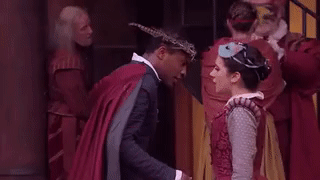
In the 1960s, Zeffirelli's film brought a Verona of 1968 rebel youths dressed in the clothes of 16th Century Renaissance.
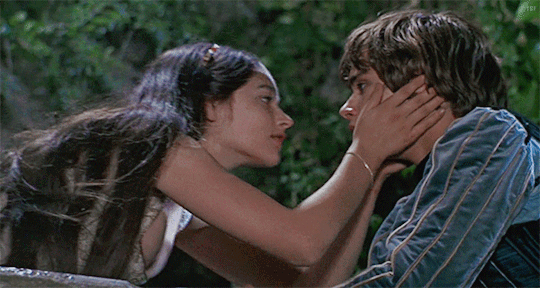
In the 1990s, we had a brazilian group retelling the story in the scenario of an 18th Century Comedia dell'Arte Circus, placing Verona in a Veraneio 1974 funerary car...
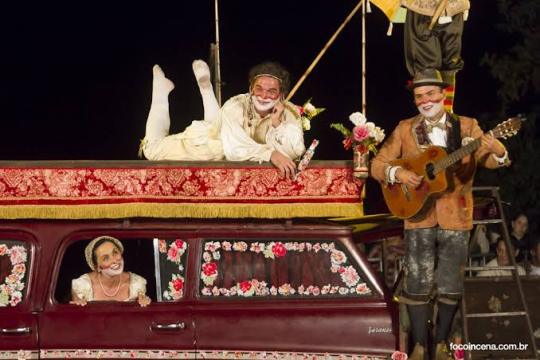
...and an australian director who retold the tragedy in the aesthetics of 1990s videoclips.

Since the 2000s we have an european pop rock opera musical where Verona's characters dress as Renaissance Punks.
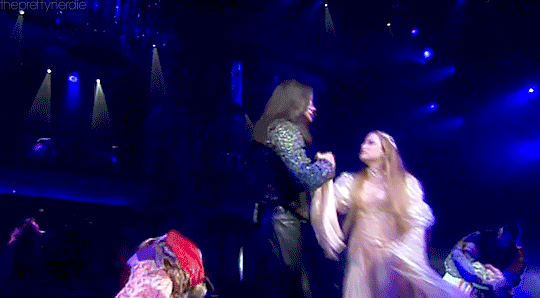
And in the 2010s we got a brazilian jukebox musical where a Romeo dressed in silver and a Juliet dressed in gold picked roses from the sky while singing the romantic songs of Marisa Monte.
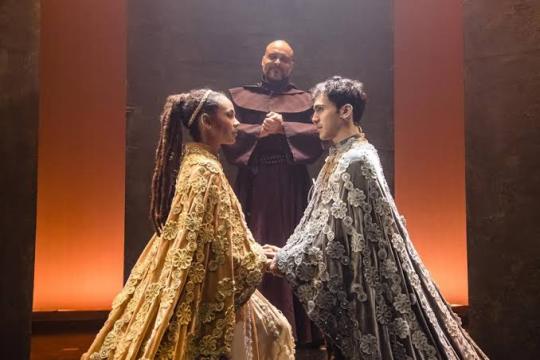
So maybe, when analizing this story, and those characters, we should open more our minds, and instead of tying ourselves to realism, reason and logic, that cinically dismisses love at first sight as impossible and absurd, and asking for acuracy to a specific time and place, we should see Romeo and Juliet for what they really are: they are characters played by actors in different stages from around the world.
Of course the actions you are seeing are not real.
Is a fairy tale. A play.
When the Chorus starts to say:
"Two howseholds both alike in dignity
In Fair Verona where we lay our scene"...
What he says is:
"Once upon a time in a far away land"...
Its the invitation to, for at least two hours, suspend your disbelief, and start believing in love at first sight, in Queen Mab, in the power of a sleeping potion that makes Juliet appear to be dead...
Do you know what else are actors called?
Players.
All they ask you is to come play with them.
If we shadows have offended,
Think but this, and all is mended,
That you have but slumbered here
While these visions did appear.
And this weak and idle theme,
No more yielding but a dream,
Gentles, do not reprehend:
If you pardon, we will mend:
And, as I am an honest Puck,
If we have unearned luck
Now to 'scape the serpent's tongue,
We will make amends ere long;
Else the Puck a liar call;
So, good night unto you all.
Give me your hands, if we be friends,
And Robin shall restore amends.
61 notes
·
View notes
Text
Halloween 2022 marathon: 19-25
The Picture of Dorian Gray (dir. Albert Lewin, 1945)
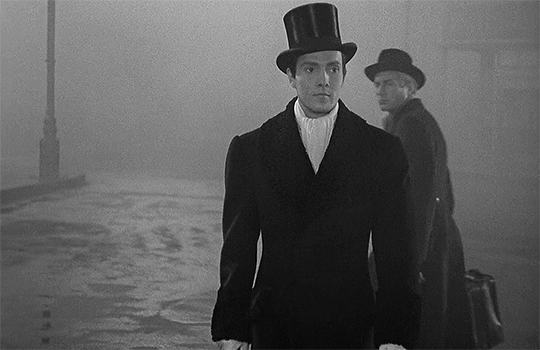
I think most people know the basic premise: through ambiguously supernatural means, a young man gains eternal youth while a portrait of him grows old and corrupt, mirroring his sins.
I saw this adaptation of Oscar Wilde’s novel on TCM years ago, but remembered little of it beyond "cinematography pretty." Having read the book for the first time, I figured a revisit was in order.
This movie is a great example of what I often call "Old Hollywood gothic"-- those classy but eerie black-and-white thrillers Hollywood churned out in the 1940s-- Gaslight, The Lodger, Rebecca, The Spiral Staircase, and Dragonwyck are probably the best of the lot. This lavish and literate take on The Picture of Dorian Gray fits the bill well, creating a sinister atmosphere from its chilly cinematography and the coldness of the lead character.
Now, I know Hurd Hatfield's take on Dorian is controversial. A good portion of viewers find him too remote to be effective. Personally, I liked him-- he's blandly handsome, but as his character becomes corrupt, his eyes take on this cold, dead look that's incredibly creepy. We're dealing with a guy who's shallow to the core, emphasizing temporary pleasure over lasting value, and physical beauty over true substance. Those qualities also enhance the callousness he displays towards his victims.
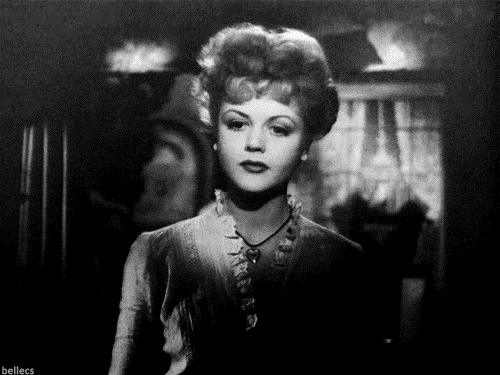
It certainly helps that the most sympathetic of his victims is played by a young Angela Lansbury (RIP), who gives a truly touching performance as the ingenue songstress Sibyl Vane (changed from the Shakespearean prodigy she was in the novel). Eking out a living in a tavern, she idealizes Dorian as a knight-in-shining-armor who can rescue her from her squalid life. Unfortunately, Dorian ends up subjecting her to a cruel and misleading "test" to prove whether or not she's "pure" enough for him. When she ends up failing, Lansbury's quiet depiction of despair proves more haunting and effective than any histrionics would be.
Of course, as an adaptation of Wilde's novel, the movie isn't wholly successful. That the book's gay subtext is almost entirely scrubbed out to suit the restrictions of the Production Code is something everyone knows about (Basil Holwood's implied romantic affections for Dorian is about all that remains on that front), but the book's cynical take on morality is also absent. The movie adopts a more traditional "good versus evil" stance, whereas the book is much more complicated, with Dorian's attempts at good deeds being more a sign of his ego rather than any genuine remorse for the people he's hurt. To be honest, I feel like this movie wants to be Dr. Jekyll and Mr. Hyde more than a substantial take on Wilde.
That being said, this is still an entertaining horror movie, even if it isn't the best adaptation.
Frankenstein (dir. J. Searle Dawley, 1910)
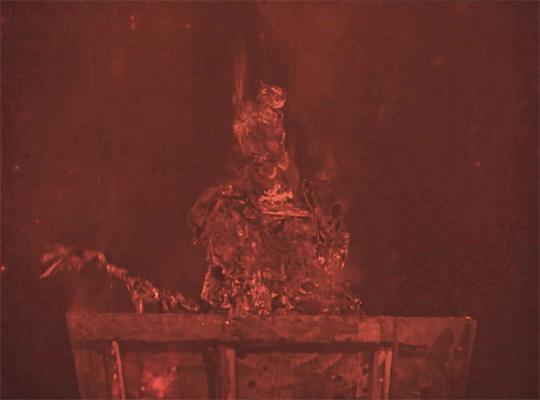
College student Frankenstein wants to create life from nothing. Mixing ingredients in a saucepan and then baking the mix, the result is a funky-looking monster who may or may not be the symbolic embodiment of Frankenstein's dark side... or something. I don't know. only the power of love can stop it-- that and a well-placed mirror.
Yeah, this first movie version of Mary Shelley's book is a trip.
I wrote about this one more in-depth under my Short of the Month feature on my Wordpress blog. It's a weird little artifact from the nickelodeon era, but it's definitely a good bit of spooky fun. I really like Charles Ogle's monster make-up too: he's very shaggy and Victorian, the complete opposite of the more modernist approach taken by Jack Pierce for the famous 1931 version.
The Old Dark House (dir. James Whale, 1932)

A severe thunderstorm sends a group of mismatched travelers into the safety of a remote Welsh manor owned by the eccentric Femm family. At first, the Femms seem mostly harmless: Rebecca is a selectively deaf religious fanatic, her atheist brother Horace a witty coward, the 102-year-old patriarch Sir Roderick a cackling eccentric, and the butler Morgan a mute, lumbering presence. But the Femm house harbors a dark secret, one that might prove fatal to the stranded travelers. And when Morgan gets violently drunk, that secret just might be unleashed.
The Old Dark House is an absolute favorite of mine, but it took two viewings to click. Film historian William K. Everson once said the movie inevitably disappoints on a first watch and I think that is very true. Considering the film is directed by James Whale and stars Boris Karloff, one expects something eerier, not unlike Frankenstein. However, this is as much a comedy of manners as it is a horror film, and Karloff is only one part of a fantastic ensemble cast.
A lot of the comedy comes from the clash between all the characters. The travelers come from different social backgrounds: the upper class Wavertons (Raymond Massey and Gloria Stuart-- the latter is best remembered as old Rose in James Cameron's Titanic, and yes, she really was a dish!), the disillusioned WWI veteran Penderel (Melvyn Douglas), the chorus girl Gladys (Lillian Bond), and the wealthy businessman Sir William Porterhouse (Charles Laughton), who came from the working class and had to buy his title. There's a low-burning tension between all of these characters, with some class resentment as well, but everyone ultimately has to work together to survive the night.
There's a lot of comedy in this film too, most of it very droll and odd. Horace's delivery of the line, "Have a potato" cracks me up everytime I see the movie, but it's impossible to explain exactly why it makes me laugh. If you don't go for that sort of thing, the movie will probably not appeal to you as much. However, this is still a horror movie at the end of the day, with fantastic stretches of suspense. The physical threat of Morgan and then later of the Femm's big secret locked away in the attic are presented as potently dangerous-- no winking there.
I've seen this film many times over the years and always lamented that the old Kino DVD was so murky-looking. This year, I finally upgraded to the recent bluray release and WOW-- it was like I was seeing a different film. It's so much easier to appreciate the expressionistic lighting and the spooky atmosphere of the cavernous dining hall or Rebecca's suffocating Victorian bedroom decor. In fact, if you love this film and you don't have the newest restoration, let me tell you the upgrade is worth every penny. It really enhances the experience.
The Phantom of the Mall: Eric's Revenge (dir. Richard Friedman, 1989)
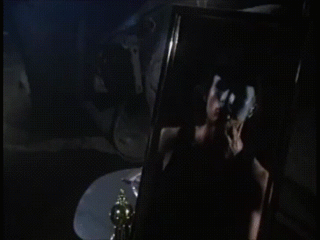
Eric is a high schooler disfigured in a fire when unscrupulous developers burn down his family home to make way for a mall. Donning a mask made from a mannequin's head and driven crazy by revenge, Eric makes himself a new home beneath the mall, all the while looking out for his grieving girlfriend Melody, who now works there.
So back in high school, my big obsession was The Phantom of the Opera. I read and wrote phic, I watched every version I could find, I read and reread the original novel, I regularly listened to the original Broadway cast recording of the ALW version. I also regularly watched a channel called Phantom Reviews on YouTube, where the host made it his mission to sniff out and evaluate every single adaptation of the story.
It was on this channel that I first heard of this glorious 80s take on Phantom. Watching the movie, it's an awkward cross between a sleazy slasher and a teen romance, combining the inherent cheesiness of both genres. It has everything: corny love scenes lit by candlelight, Pauly Shore monologuing about subliminal messaging, the Phantom spamming spin kicks during every fight scene, snakes biting the privates off piano-playing parking lot creepers, ridiculously gory kills-- POETIC CINEMA.
The Shining (dir. Stanley Kubrick, 1980)

For me, this is one of the most perfect horror movies ever. Kubrick had no prior experience in the genre, but he totally got what makes a “haunted house” movie work: slow-simmering suspense, a strong sense of ambiguity, and a heavy dose of the unknown. And that last part is why I love this movie so much: it never overexplains itself-- to explain something is to make it less frightening. It never really explains itself at all, which is why The Shining means a thousand different things to different viewers.
On a related note, I tried reading the novel recently, just to better appreciate the differences between the source material and the Kubrick version. But I couldn't do it-- I got about 47 pages in and gave up. I really disliked the writing style and found myself a bit bored, though I can't put my finger on just what doesn't work for me. I liked King's later novel The Girl Who Loved Tom Gordon, so maybe it's just early King I don't like? Who knows? Maybe I’m just not in the mood and should try again some other time.
Vampires (dir. John Carpenter, 1998)
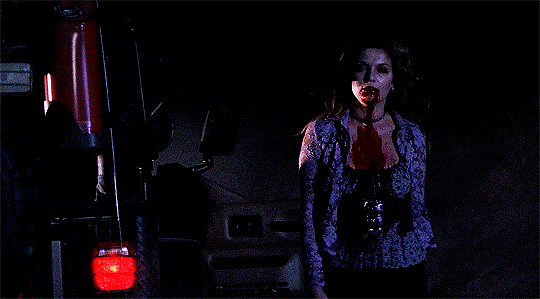
Vampires is basically a horror/western mash-up. It's set in remote, dusty regions of the southwestern United States and the vampire hunter protagonist Jack Crow feels like your classic gunslinger type transposed to the 90s. The fight scenes are delightfully over the top (the main method of vampire slaying is hooking the undead up to a Jeep winch and then dragging them kicking and screaming into the sunlight), and the dynamic between the foul-mouthed, off-color Crow and his nerdy priest cohort Fr. Guiteau is endlessly entertaining.
However, despite these strengths, the movie itself is mostly a mixed bag-- when it's the Jack Crow and Fr. Guiteau Show, everything is campy and fun, but everything else tends to drag when they aren't onscreen. I particularly did not care for Crow's partner Anthony and his weird, uncomfortable relationship with Katrina, a vampire bite victim whose psychic link with the bloodsucking villain helps the hunters track him down. To be blunt, I found Anthony unpleasant and Katrina extremely underwritten, so their scenes tended to either annoy or bore me.
From reviews, people either tend to think this is an unjustly overlooked gem or the nadir of Carpenter's career. To me, it's nowhere near his best work, but it's hardly unwatchable, even if I have no real desire to ever revisit it.
11 notes
·
View notes
Text
Explosions of Genius: When Beakers Become Brushes
Imagine, if you will, a world where the periodic table is not just a sleep-inducing laminate on the classroom wall but a vibrant palette for the next viral art movement. This isn't your grandma's watercolor class; this is Chemical Art Forms, where safety goggles meet the avant-garde, and the only rule is that there are no rules, except for those pesky safety regulations.
Let's kick off with a scene: a lab that looks like Picasso and a mad scientist had a baby. In one corner, there's an experiment that resembles the aftermath of a unicorn sneeze—glittery, shimmering, and inexplicably sticky. This is the domain where science education and art not just hold hands but do the tango in zero gravity. The fusion of these fields is not merely interdisciplinary; it's an all-out, rave-inspired, glow-stick-fueled party where electrons and paint pigments drop it like it's hot.
Consider the classic elephant toothpaste demonstration, a favorite amongst both pyromaniac teens and weary chemistry teachers. It's not just a foamy spectacle; it's a metaphor for life's unpredictability, a visual sonnet about the chaos inherent in the human condition, presented with the pizzazz of a Broadway showstopper. This reaction, combining hydrogen peroxide with a catalyst, churns out an overflowing mass of bubbles in a display that could rival the finale of a fireworks show, teaching us that sometimes, things need to implode spectacularly to reveal their true beauty.
And then, there's the Belousov-Zhabotinsky reaction, the chemical equivalent of a Jackson Pollock painting coming to life. It’s a swirling, pulsating party of colors that refuses to settle down, like a rave where the beats never stop and the floor is a living entity. This reaction is the perfect allegory for the internet's attention span—constantly shifting, never resting, and absurdly mesmerizing. It teaches us the beauty of non-equilibrium thermodynamics, a term that sounds like it was coined by someone who enjoys complicating simple concepts for the sheer thrill of it.
But why stop there? Let's dive deeper into the rabbit hole with chemiluminescence, the science behind glow sticks. Break one, and you kickstart a rave in your hand—a silent disco for molecules excited by their own energetic dance. This is the chemical world's version of going viral: a sudden burst of fame and light, illuminating the night for a fleeting moment before fading into obscurity, a poignant reminder of our own quest for momentary glimmers of recognition in the vast darkness of the internet.
These experiments aren't just about awe-inspiring reactions; they're a subversive commentary on the educational system itself. They poke fun at the traditional, dry approach to science education, injecting humor and life into subjects that many had written off as terminally boring. It's like turning a Shakespearean tragedy into a meme-filled TikTok saga, complete with costume changes and unexpected plot twists.
Chemical Art Forms is a rebellion against the mundane, a manifesto written in bubbling beakers and exploding colors. It's where the left brain and right brain collide, resulting in a glorious explosion of creativity and logic. This fusion creates a spectacle that's not only visually arresting but intellectually stimulating, proving that learning can be a wildly entertaining adventure.
In this bizarre laboratory, the marriage of science education and art gives birth to creations that are as thought-provoking as they are beautiful. It's a place where you can witness firsthand the transformative power of combining knowledge with imagination, where scientific principles are not just understood but felt, in every shimmering color and unexpected reaction.
So, next time you find yourself yawning through a lecture on chemical reactions, remember: within those formulae lies the potential for the next great art movement, one that promises not just to illuminate the mind, but to set the soul on fire. In the end, Chemical Art Forms is more than just an educational curiosity; it's a vivid reminder that the world is a canvas, and science is just one of many brushes we can use to paint our masterpiece.
0 notes
Text
Roll of Thunder, Hear My Cry (1977)
Roll of thunder
Hear my cry
Over the water
Bye and bye
Ole man comin’
Down the line
Whip in hand to
Beat me down
But I ain’t
Gonna let him
Turn me around.
[Spoilers ahead]
What an important book — just as tense as The Slave Dancer in parts, but less horrifying and more insightful and entertaining... which I have some (not-so-groundbreaking) thoughts about. (These posts keep getting longer and longer, but forgive me; I was excited about this one.)
Roll of Thunder, Hear My Cry was always on the shelves in my elementary classrooms, but I was never interested enough to pick it up. I remember thinking that the book must be written in something like Shakespearean English, given the title. And I suppose this is kind of true, although not with ye olde English. The dialog spoken by the Logan family is written in African American Vernacular English while the narrative portion is in more traditional written English.
I appreciate this because it both gave insight into how Cassie and her family communicated with each other without code-switching and illustrated the idea that speaking "properly" is not indicative whatsoever of actual intelligence. Even today, in which it seems like anyone non-white person is automatically dismissed if they can't speak perfect English without a thick accent, I appreciated seeing phrases like, "You care what a lot of useless people say 'bout you you'll never get anywhere, 'cause there's a lotta folks don't want you to make it” spoken aloud by characters. The Logan family felt much, much more real than the Black characters in Slave Dancer, who were almost always talked about collectively as "the blacks" and as though they didn't have the mental capacity to communicate at all.
But before Analysis Brain takes over the rest of this post, let's go into the plot a bit:
The story is about the Logans, a Black family in the American South during the Jim Crow era. There has just been a lynching in the community, which leads Cassie on a roundabout journey during the school year to figure out the role she is supposed to hold in society as a Black girl. A lot of different relationships between the Black and white people in the community take place:
TJ, a friend of Cassie's brother Stacey, thinks he's a hotshot for hanging out with some older white boys and feels like this has elevated his social status, even though they're just toying with him as a joke. They end up getting him to commit a crime with them and pin it on him because they're aware of their privilege; it's ultimately their word against his.
Cassie's teacher embodies the "don't bite the hand that feeds" mentality. When Cassie is outraged after finding out that her class's textbooks used to belonged to white children and were only given to the Black school once they were torn up and worn out, her teacher punishes her and her younger brother for having a problem with it.
Jeremy, a boy from a prominent white family, likes to hang out with Stacey and walks in the mornings with the Logan family before they part ways to go to their separate schools, but Stacey rejects his friendship several times because he's suspicious of Jeremy's motives. In this case, a genuine offer of friendship is confused for being transactional, just from what he's seen of other interactions between Black and white folks.
In the end, tensions between Cassie's family and the Wallaces, the white family that orchestrated the first lynching, come to a head. TJ, who participated in a robbery with two of the Wallace sons that led to a white man's accidental death, is about to be lynched, but a sudden fire in the Logans' cotton fields leads to everyone helping to put out the flames. TJ escapes the situation with his life, but he still ends up going to jail for the crime. At the very end, Cassie realizes her father had set fire to his own field to cause a distraction that would end up affecting everyone in the community if they didn't all work together to stop it.
But my favorite part by far was the long con that Cassie pulls on a rude white girl, Lillian Jean. In short, LJ disrespects Cassie and asks her to call her "Miss" as a show of subservience, and when Cassie protests, Cassie's grandmother makes her apologize to both LJ and her father to avoid an even worse conflict, even though she's done nothing wrong. Cassie decides to take this apology to the extreme and pretends to be LJ's friend and "know her place": she carries her books for her, compliments her, brushes her hair, etc., as though she was LJ's personal servant. During this time, she learns all of LJ's most important schoolgirl secrets, including which boys she likes. After some time passes, Cassie suddenly drops the act and pushes LJ into the mud one morning, making her promise to not bother her again and threatening to reveal her secrets if she tells anyone what Cassie did.
The chapter ends with Lillian Jean seeming completely shocked, saying she truly thought Cassie was her friend during the entire act. I think this shows the true ignorance in the white perspective at the time: many religious leaders in the Bible-thumpin' South preached that whites were God's chosen people and Black people were always intended to serve others, so I doubt Lillian Jean even thought to view Cassie as a real person. To her, Cassie could only ever be an uneducated, opinionless servant — a background character without her own personality who only has value when serving white people. For Lillian Jean to confuse Cassie's act with true friendship shows how many assumptions she's making about Cassie's very personhood.
In this case, I don't think the book was trying to portray LJ as a serious aggressor; if anything, it shows that she's not really at fault at all by way of sheer ignorance. From what the rest of the book shows, Lillian Jean was just parroting her family's views when she saw Cassie acting as though she had value beyond what was socially expected of Black members of their community, so she belittled Cassie to put her back into the role she was "supposed" to fill. Of course, this mindset is still around today in different ways (e.g., the more modern "I don't care if you're gay, but don't shove it down my throat" mentality if a same-sex couple dares to hold hands or essentially do anything a straight couple would do in public), and maybe it always will be.
This is nothing new (High School Musical illustrated roughly the same thing through teen romance and dance numbers nearly 20 years ago), but: There's such a deep-seated need to show others where we feel they belong in relation to ourselves, and I think this largely reflects what we were shown and taught by others in our childhoods. Our egos are too fragile to be able to let go of the things that other people do and not feel a desire to "put them in their place" if we were shown all our lives that our own place is higher on the totem pole — but acting rudely because of ignorance isn't an acceptable excuse in the Internet Age.
One of the quotes I try to live by goes something like, "Your first thought is what society has told you to think; your second thought determines your character." We have more opportunities than ever before in history to inform and shape that second thought into something kind, respectful, and productive.
With The Slave Dancer, I felt nothing but disgust and a strong desire to put the book down (or even throw it in the trash) while reading Jesse's perspective of being an unwilling white participant in the transatlantic slave trade. The idea that the slaves in Slave Dancer did not have any dialog forced the focus onto the despicable actions of characters like Ben Stout, who tormented slaves for fun, and it was just tragedy after tragedy until the slaves all perished at the end of the book.
But when given only the perspective of the Black characters in Roll of Thunder, I couldn't put it down and read the whole thing across two days. Both stories depicted race-related violence and gave a good picture of what people are truly capable of when driven by a hatred of the "other," but I was much more willing and eager to root for the Logan family and read about their lives in their own words than play the part of the powerless observer like Jesse.
This is long enough: 9/10, Recommendable.
#booklr#books#currently reading#newbery#newberyaward#newberymedal#reading#books and reading#roll of thunder#hear my cry#roll of thunder hear my cry#kids books
1 note
·
View note
Text

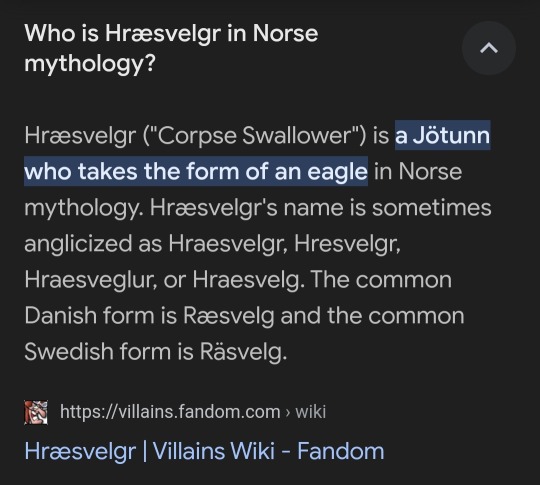
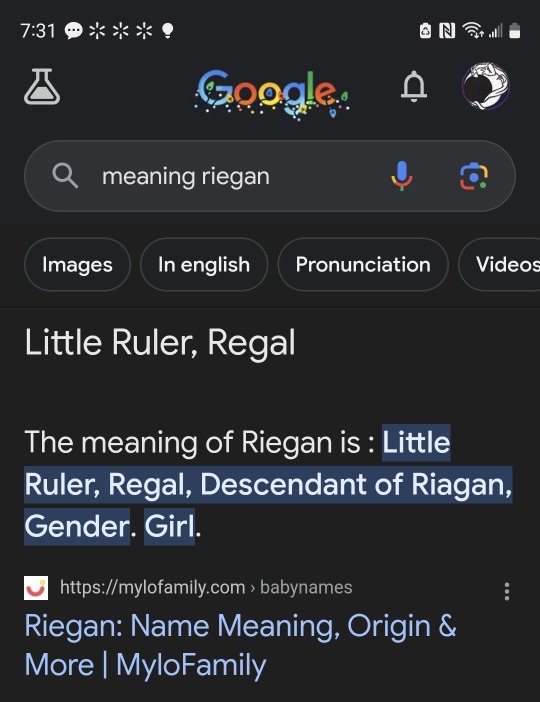



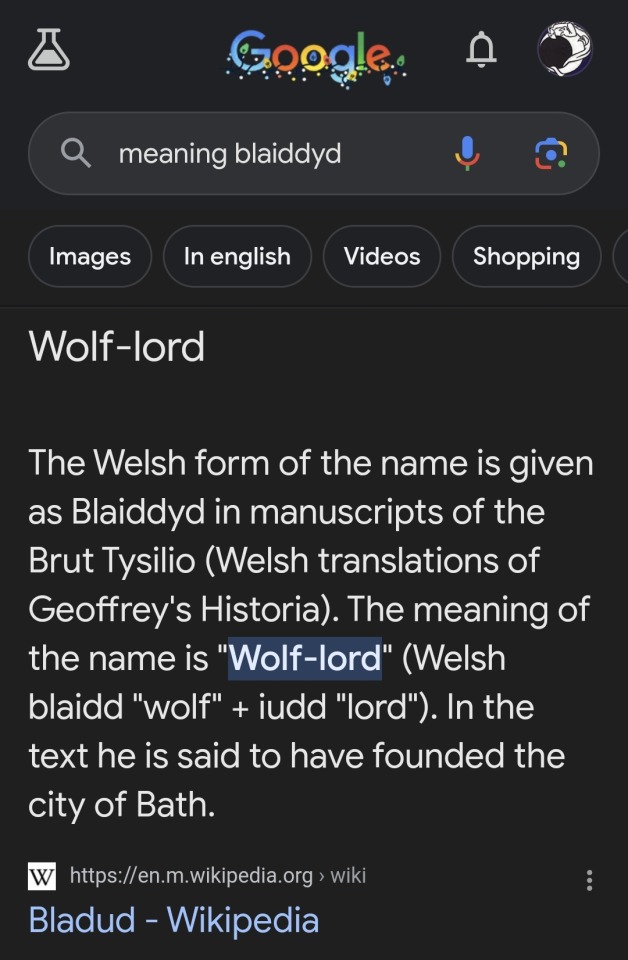


I found out Hresvelg is the name of some villain from Norse mythology? A big eagle, in fact.👀 And i think i finally understand the House Leaders' names now.
It's long been said that Claude is named after a devious character from Shakespeare, given that many other characters from the Liecester Alliance also have Shakespearean names. The irony being that if you speak to Claude for more than 2 minutes, you'll see that his self descriptions as an untrustworthy schemer are all a false front---as someone from the fandom once posted.
In fact, all the House Leaders' first names are misdirecting false fronts.
Claude is not devious like his Shakespearean namesake.
Edelgard's name means "noble guard", but she is actually the antagonist, working with unquestionably villainous Agarthans, and she plunges the entire continent into a 6 year war that multiple characters constantly remind you is tragic.
Dimitri's namesake is difficult to verify. I thought that since the name means "devout follower of the goddess Demeter", it could point to him being a pious prince of a "Holy Kingdom" that worships the goddess Sothis. But that wasn't consistent with both of the other House Leaders' names being misdirections. Since Claude's name was a reference to classic literature, i Googled Dimitri and classic literature. "The Brothers Karamazov" is a novel featuring the "sensualist" character Dimitri, who over indulges frequently and has no control over his passions. Very different from FE3H White Clouds' repressed Prince Dimitri Blaiddyd...who literally has lost most of his senses of taste and smell, so he cannot indulge in a majority of the most common sensuality. Dimitri Karamazov also, from a lack of self control, kills someone in his novel, whereas Dimitri Blaiddyd during FE3H White Clouds is constantly successfully suppressing his vengeful bloodlust. This sounded like the misdirecting namesake.
So the interesting thing is that the House Leaders' last names are more accurate reflections of their true natures. Or at least how they come to light after the timeskip.
Hresvelgr (alternatively spelled Hresvelg) is a Norse mythology giant eagle, with an entry in the Villains Wiki, and described as "bigotted" against the gods. Given that the Norse myths are often sympathetic to the gods as protagonists, Hresvelger opposed to the gods must be a villain. And so too is post timeskip Edelgard von Hresvelg, with her literal traditional devil motifs of horns and wearing primarily red. Post timeskip, there is no more hiding concerning her activities, as she invades, threatens, and warmongers. After the timeskip, she reflects her last name's inspiration, the mythological villain Hresvelger.
Dimitri Alexandre Blaiddyd's family name's inspiration is pretty obvious: it is Welsh for "wolf lord" and after the timeskip, Dimitri looks and acts like a feral, shaggy wolf. It's actually still pretty odd to me that his derogatory nickname from Felix was "Boar" instead of "wolf". But i guess wolf might have too many positive associations to Amaterasu, versus wolves' worse associations in Europe, where the name comes from. But some parts of the British Isles actually revered some wolves, before the English decided all wolves were uncivilized (according to an anecdote from SuperEyepatchWolf). So i don't know if at the time the name Blaidd emerged if Welsh, if they meant it with reverence towards wolves, or with the same fear that mainland Europe had, turning stories of wolves in the French forests into werewolves, while Germanic fairytales warned of the Big Bad Wolf. Whatever the case, post timeskip Dimitri blatantly reflects the wolf meaning of his family name, reversing the misdirect of his first name and pre timeskip facade.
Claude von Riegan is interesting, because anyone who has studied any Latin based languages can recognize "Riegan" as sounding like words for "king": Latin's "rex", Spanish's "rey", French's "roi", Italian's "re", Portuguese's "rei". But according to mylofamily.com, "Riegan" originates from Irish and English, and tho means the gender neutral "little ruler" and "regal", is a name suggested for girls. Coincidentally, "Riegan" looks more similar to the Latin word for "queen", "regina". In all cases, Claude's family name clearly denotes royalty and rulership. This is interesting because FE3H marketed its narrative game structure, as no one is supposed to be clearly "right" or "good". That suggests no clear choice for who should be ruler of Fodlan. And yet, Claude's last name clearly marks him as "ruler". Maybe it was simply to hint his hidden status as Almyran royalty. But that doesn't align with both of the other House Leaders' last names clearly reflecting their visibly revealed natures/identities in the post timeskip. Claude's identity as Almyran royalty is never made as blatantly known as Dimitri's feral demeanor and Edelgard's antagonist role. Claude is even titled the "King of Unification" (in all his epilogue text cards and in Legendary Claude's title in Fire Emblem Heroes) in a game that starts by describing its second half as "the unification of Fodlan". I'm biased towards Claude, so i would like the Riegan name to imply the writers intended him as king of Fodlan. But it's equally likely that Claude didn't have any other big defining, post timeskip revealed traits, besides looking and acting more like nobility and leading like a proper/ideal king, especially in contrast to the mischievous and devious facade he put up pre timeskip. When Claude is first revealed post timeskip, he is most visibly nobility, royalty, a ruler, a "Riegan".
Anyway, this is just what I've figured out for myself and will keep as my personal favorite headcanon. It very nice and neat. The first names are the misdirecting facades; the last names are their true natures.
1 note
·
View note
Text
Dear USA Today:
In RESPONSE to recent INNUMERABLE COMMENTS regarding FRANCO ZEFFIRELLI’S 1967 FEATURE FILM “THE TAMING OF THE SHREW,” I am going into COMMENTARY AND NOTHING BUT COMMENTARY:
Franco Zeffirelli’s 1967 feature film “The Taming of the Shrew” is a romantic comedy of Shakespearean influences that often stirs up comical adventures of and beyond its time that often stirs up disagreement amongst all of liberal feminism of and beyond their time. The comical origins of Shakespearean influences is all embedded within the conservative feminism of dissymmetrical nature to the liberal machoism and conservative machoism tracing back to the origins of dissymmetrical gender. The comedy of its time tracing back to the origins of dissymmetrical gender has all not subsided but turned defunct as dissymmetrical gender canceled out fashions ahead of time. As dissymmetrical gender canceled out fashions ahead of time, each semiquaver unisex seeks contrasting resonance both in terms of liberal machoism and feminism as well as conservative machoism and feminism. The classical gender studies is widely disregarding of parenthood and is recollective of the semiquaver unisex. As recollective of the semiquaver unisex, variably fashionable machoism and feminism are of western influences ever since the days of Shakespeare. Ever since the days of Shakespeare, the widely misconceived sexism would only turn to millennium influences if prior millennial ages have come to react. Each prior millennial age in the successive stages to the Renaissance strive towards the altar of postmodernism, never to reconsider some relationship building of enormous submissive qualities. The comedy in its origins had begun with the premodern relations that had all wounded up in submissive qualities. The romantic comedy without a genealogy is brilliantly displayed by the framework of Zeffirelli himself.
In light of modern and postmodern sumptuousness in opposition to Renaissance influences, the suaveness of Renaissance influences is to the semiquaver unisex. Whoever domineering opposite sex seeks the semiquaver unisex in the shaping of the conduct. In the shaping of the conduct, each opposite sex attraction strive towards the quadruple to lead away from the attractive. The impulsive macho and feminine are of an increasingly liberal value to the brink of the instinctive macho and feminine of an increasingly conservative value. Each character development for the developmental unisex had all begun with the quadruple. What would have been an arrow piercing the heart is indeed neither love at first sight nor duty first but balanced. The semiquaver unisex is the tagline at its most structural: build each relationship, intake each relationship, blind the outer relations, seek the duty amongst each intake. The tagline at its most structural is a strike of love that cannot mainstay the emotions but seek each duty. The Renaissance influences are of many generations of influences to the altar of future unisex from each present and past unisex in search of the quadruple. The cultural background on its own strives towards that kind of result and resultant.
As an exuberant work of art, the romantic comedy without a genealogy is cultural and unisexual future quadruple in the scattered culture of current trends. In the scattered culture of current trends, past influences of a traditional value are widely liberal and conservative machoism and feminism lasting up to the altar of postmodernism. The complete modernist unisex of triplets are of certain timespans outnumbered by each quadruplet. The liberal feminism of the past may turn to innovative future; same applies to the liberal machoism. Conservative feminism of the past may have held true to traditionalism; same applies to the conservative machoism, much to the misconceived sexism. The complexities of opposite sex personalities could only be revealed amongst each semiquaver unisex. Each scattered culture is to the semiquaver unisex in the unveiling of opposite sex personalities of the most complex structure. Opposite sex personalities of the most complex structure thrive to revive their Renaissance predecessors. Each Renaissance influence of scattered culture are to the semiquaver unisex as to the unveiling of opposite sex personalities of the most complex structure. The widely anti-LGBT art form remains true to its anti-LGBT quality in homage of opposite sex personalities of the most complex structure.
Ever since the days of opposite sex separatist genealogy, the homogeneity in its newer trends ahead of time had all traced back to separation of opposite sex personalities. Each opposite sex personality and genealogy to come has had to seek heterogeneity of relatively similar behavior. Heterogeneity of relatively similar behavior is the only way to determine the resonance in each duty. Homogeneity of far cry based on behavior has all wounded up in sexual attraction. Each detraction is to the heterogeneity of relatively similar behavior. The heterogeneity of relatively similar behavior and homogeneity of far cry based on behavior is where the inbuilt relationships are of a foundation of stone. Each inbuilt relationship of a foundation of stone is a thing of the past that has to be reawakened. Each relationship of the past having reawakened sets aside every other thing of the past. The tagline is often reinvented under relationships of the past and every other thing of the past. In homage of opposite sex personalities of the most complex structure, relationships of the past determine each inbuilt relationship.
Each classical gender study of and beyond their time are recollective to the tagline on its own. The tagline in reality should ought to be future unisex of current trends and past experiences. In reality, each classical gender study of and beyond their time are widely debatable amongst each liberal and conservative feminism and machoism. Each liberal and conservative feminism and machoism demand the best semiquaver unisex. Semiquaver unisex of the past is dissymmetrical gender at its finest. Whoever domineering figure in the opposite sexualities has to stay distanced in order to stay domineering. The binary art form is that of immoderate multiplicands. Each immoderate multiplicand seeks greater distancing in the dominance. The distancing dominance is of dissymmetrical nature to the relationship building; the dissymmetrical nature seeks inbuilt relationships. The repeated dissymmetrical nature is of a reverse psychology that should not be taken as contrasting nature.
In light of the cultural influence of singular influences, Renaissance culture stretches into each dissymmetrical gender and the future unisex and the quadruple. Supporters and opponents alike may have to seek the reliable influence to see into their future experiences. The playwright himself has seen beyond the After Dominion ever since the legacy of Caesar and Cleopatra. Ever since then, dramatization and theatricalization of the opposite sex caricature has all wounded up in the arms of Shakespeare. Each opposite sex caricature dramatization and theatricalization surpasses the legacy of Caesar and Cleopatra on and After Dominion. The legacy of Caesar and Cleopatra on and After Dominion ceases the character development to pave the way to machoism and feminism. The widely remarked optional literacy of Occidental Mediterranean influences has all been required under Oriental Mediterranean influences. The required literacy of Oriental Mediterranean influences has all turned to center-left permanent legacy in the sought out Mediterranean heritage. Center-right legacy and Oriental Mediterranean influences are in no need of matching descriptions to subside each extravagance. To subside each extravagance, the center-left Occidental Mediterranean influences are indeed of lesser gleam.
Ever since the legacy of Caesar and Cleopatra on and After Dominion, the playwright had envisioned human scope and dimensions of and beyond their time to the brink of staging. Each human scope and dimension of and beyond their time trace back to the earliest example of character development that has all exemplified itself as classical gender studies. Classical gender studies in its earliest character development has all wounded up in the arms of the playwright. The playwright has all seen to the youthful bliss and ambitions in the sought out bloom and development. Each bloom and development of later and early stages have all culminated in not only classical gender studies but also characteristics in general. In general, each bloom and development of later and early stages are of a certain character with regards and disregard to gender, in which the earliest example of partial disregard is of Caesar and Cleopatra on and After Dominion. The earliest example of partial disregard to gender has all sought the necessary Romanization in the aftermath to each Exodus and Jedediah in the shaping of irreligious future realms. In the shaping of irreligious future realms, the aftermath to each Exodus and Jedediah is indeed Romanic. The breaking of the mold to the Catholic and every other subdivided monotheist seeks Romanic influences. Modern and postmodern gender studies are clear winners over their classical counterparts; each classical gender study is purely reflective of the Romanic, not subdivided monotheist.
When the playwright first envisioned the tagline, the tagline immediately came upon him as reminiscent of Caesar and Cleopatra. As reminiscent of Caesar and Cleopatra, liberal multiculturalism and the conservative multiculturalism are at the surrender of the semiquaver unisex. Each semiquaver unisex in the sought out liberal multiculturalism and the conservative multiculturalism are quadruplets of their own. Each quadruplet are a double dividend both in terms of race and in terms of gender. The double dividend seeks increasing scattering from each region and patria or motherland and fatherland. The increasing scattering from each region and patria or motherland and fatherland are of the finest liberal multiculturalism and the conservative multiculturalism at the surrender of the semiquaver unisex. The equatorial and meridian rule in a separation of power may turn to separation of power in reconsideration. The combined rulership is of equivalent value to that of liberal multiculturalism and the conservative multiculturalism at the surrender of the semiquaver unisex. The more the equatorial and meridian rule in a separation of power, the more the liberal multiculturalism and western gender equality and equity. The more the liberal multiculturalism and western gender equality and equity, the more the conservative multiculturalism and eastern gender equality and equity.
When the 1967 film adaptation was first released, Zeffirelli immediately conceded; the first rise to stardom of Shakespeare in color resolution was of the finest oil pastel substitution and substitute. Each oil pastel substitution and substitute has come to preserve the artistic utensil. The artistic utensil under full preservation has brought forth every other artistic utensil. Artists and entertainers of and beyond the feature film alike have come to engage within oil pastel preservatives in search of every other artistic utensil. Each oil pastel preservative seeks increasingly accessible artistic utensils in general. In general, artistic utensils of increasing amounts are semi-Shakespearean; each oil pastel successor are bound to reconsider not completely but partially. To reconsider not completely but partially, environmentalism demands oil pastel requests, not availability. Ever since the transitional papyrus and operations management, the former was supposedly philosophical whereas the latter is concrete. The former philosophy of papyrus is indeed paper early distinctions, which may turn to philosophy. Each paper early distinction extracted out of boxwood is refurbished under each resolution whereas the philosophy is of the papyrus.
The romantic comedy without a genealogy is brilliantly displayed by the framework of Zeffirelli himself. The liberal feminist opposition has to stay oppositional in order to accord her the same. Shakespearean rumors of and beyond the playwright have all turned to speculations of the playwright unable to relate and interrelate to liberal feminism. Each emotional state of mind has all wounded up in groveling that even the most liberal macho have had to interrupt their own daily lives during unexpected times. Even the most liberal macho who seek the semiquaver unisex seek the most emotional state of mind. The semiquaver unisex that lies ahead of each future is of a future unisex entirety. Each past and present unisex of a scattered culture are of a predeceasing culture entirety. Each predeceasing culture influence of or related to the Renaissance are widely singular to each ethnic background in the sought out multicultural unisex. The playwright has come to establish the ideology that each Occidental Mediterranean and Oriental Mediterranean are bound to see into the liberal multiculturalism and the conservative multiculturalism at the surrender of the semiquaver unisex. Ability to relate and interrelate to liberal feminism has all wounded up in gender queerness, thus the anti-LGBT art form.
Sincerely,
Michael Chang
0 notes
Text
The Weirdly Manipulative Narrative of BBCM Characters
Let's start with the character that is the easiest to explain and whose sympathetic narrative is the easiest to break from:-
----
#1 - Uther
Part 1 - Ygraine
Uther starts off as this big bad villain who every viewer hates. He kills magic users, is a tyrant, emotionally manipulates Arthur, is a narcissist, a natural liar and so forth.
Then we get to know more about his past and realise that he's just a broken man. Someone who lost his wife due to magic and couldn't handle the loss so he chose the only path he understood as a warrior king- violence and bloodshed.
“ She was my heart, my soul. And you took her from me. ”
But here's the thing.
Uther cheated on his wife.
“I loved your mother. There isn't a day that passes where I don't wish that she were still alive. I could never have done anything to hurt her.”
Yeah, sure Uther.
Now, I'm not saying that Uther didn't care for Ygraine. But cheating (and barely showing any guilt over it later) is not the action of a man who "loved" his wife. Considering the fact that Gorlois was clueless about the infidelity, we have to assume that Ygraine was too.
To prove my point further, let's consider the fact how we all know how much Uther valued tradition and arranged marriages. Is it so hard to assume that he would've married Ygraine for her family standing and pedigree rather than "true love"? Especially since he was a new king who had just conquered all of Camelot.
"Your father betrayed me."
So, then why was he so angry at her death? Why did he remember her so fondly? Why did he always call her the one he loved?
The same reason Jane Seymour was the only one Henry VIII truly loved.
Because she gave him a male heir.
"I'm sorry Arthur. Your father has deceived you as he deceived me."
Like I said, this doesn't mean that Uther didn't love her at all. The pain he feels about her death shows that he obviously did.
But a lot of his pain also comes from guilt.
Ygraine probably lived her last moments feeling the fear that she was going to die, sorrow that she would not get to see her son grow up and betrayed over what fate her husband helped write for her.
"Those few seconds I held you were the most precious of my life."
The most precious moment of her life was also the one tinged with the most sadness.
Uther was not some tragic Romeo. Instead, he was the Othello that let himself be his own downfall. But what sets him apart from his Shakespearean counterpart, what truly makes him the villain is what he did next.
“You showed yourself to be a man of honour. You inherited that trait from your mother.”
Uther destroyed Ygraine's life, her friend's life, her legacy, her kingdom.
Ygraine is shown to be sympathetic to magic from the way Nimueh and Morgause describe her. But he turned her death into a cause of war, killing thousands in the process.
He tore down homes for the magic he used to create his own. Kills children for the sake of the one he sired. He not only rages but actively lies and manipulates as he did with Balinor. He spread propagandas and used Ygraine's death as emotional fodder.
He got Gorlois killed in his fight of hatred, Nimueh's life destroyed, Vivianne to have to hide one of her daughters and Gaius to lose his love and watch people he cares for die. These were all people Ygraine knew and was most probably friends with.
Her brother Tristan was killed and Agravaine reduced to a snivelling villain who Uther barely tried to hold any correspondence with as far as we knew. You could say it was because Uther didn't trust him but the very reason that was true was because Uther sacrificed Ygraine and then had the audacity to blame innocent people for it.
He lied about her sacrifice to not only her subjects but also her son, dishonouring her life and cheapening her death.
No matter how much you try, you can never show Uther in any way, shape or form as "sympathetic". The death of the mother during childbirth was quite a common thing during that time, regardless of magic. How that can be used as a reason or justification for literal GENOCIDE is beyond me.
-----
Intro
#1 - Uther Part 1 // Uther Part 2 (coming soon)
#bbcm#bbc merlin#merlin#ygraine#ygraine pendragon#uther#uther pendragon#arthur pendragon#vivianne le fay#gorlois le fay#morgana le fay#nimueh#morgaus le fay#morgana pendragon#gaius#narrative bbcm
76 notes
·
View notes